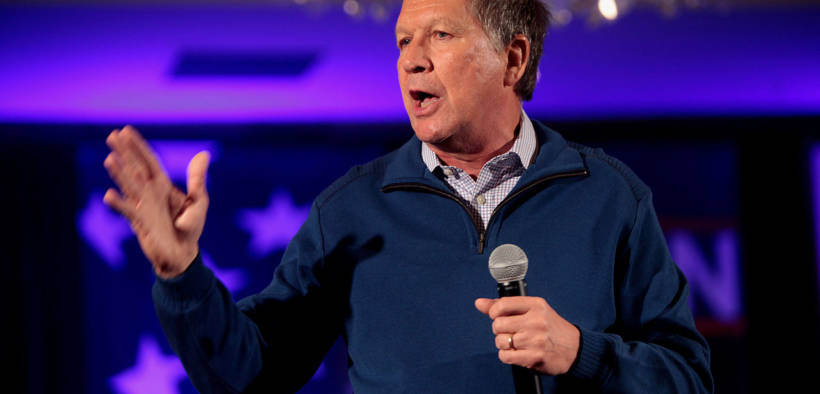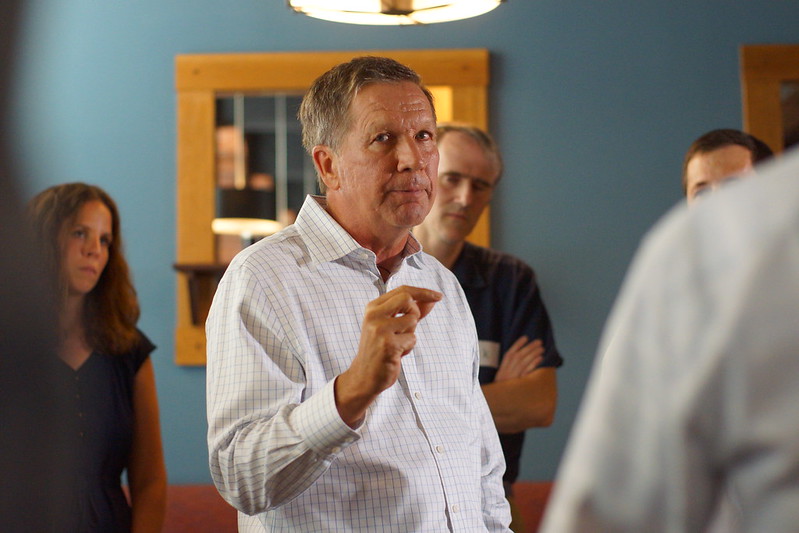The Democrats Can’t—and Shouldn’t—Rely on “Never Trump” Republicans


Reportedly, former Ohio governor John Kasich is slated to speak at the Democratic National Convention next month. If you’re keeping score at home, that’s a Republican speaking at a gathering designed to prepare the Democrats for the looming presidential election.
Does anyone else see a problem here?
Clearly, I am not alone in having reservations. In a piece for The Nation, Elie Mystal expresses his mystified incredulity at Joe Biden’s and Co.’s choice. From the jump, there’s the matter of some of Kasich’s values, which seem patently incompatible with Democratic Party values in 2020. Kasich is anti-abortion, pro-gun, opposed anti-LGBTQ discrimination laws during his tenure, and supported legislation that labor and its advocates reviled as a “union-busting attack.” This appears largely out of step with the values of a significant segment of the left-leaning electorate.
What makes the decision to feature Kasich especially egregious, though, is that it isn’t a one-off either. Kasich’s elevation is emblematic of a pattern of behavior and thinking within Democratic circles that by accruing endorsements from more “reasonable” GOP figures (at least compared to Donald Trump), they’ll win the ever-coveted working-class white vote. The problem? At least in the short term, that’s not going to happen.
Instead, Kasich’s endorsement of Biden will not only fail to capture that sought-after voting bloc, but it won’t appeal to any others, be it people of color, women voters, or both. Kasich’s speaking time, moreover, would be better served giving a platform to Democratic candidates on the rise within the party ranks or otherwise actively trying to unseat a Republican incumbent. Kasich’s inclusion is, on multiple levels, unproductive.
As Mystal believes or is starting to believe, that may be design on the part of the right and the center-right. The involvement in Democratic circles by Kasich, the Lincoln Project, and other “Never Trump” Republicans is not about doing the right thing, but rather propping up a centrist candidate whose power likely will already be circumscribed by a Republican-controlled Senate.
As evidence of this, Mystal points to all the times in recent memory Republicans, you know, failed to do the right thing by holding up a recklessly conservative agenda. There are numerous examples cited within the article—backing the likes of Brett Kavanaugh, George W. Bush, and Sarah Palin chief among them. By showcasing reality-show “talent” like Palin and staying silent when a conservative majority in the Supreme Court gutted the Voting Rights Act, the GOP have fueled the sort of conditions that gave rise to Trump in the first place. That they’ve somehow learned their lesson or weren’t already being somewhat disingenuous in appearing more moderate is therefore ludicrous.
Consequently, that some Democrats can’t see through this speaks either to their incompetence or their misguidedly slavish devotion to the idea they can hope to thrive on white working-class males at the potential expense of people of color and/or women, the essence of their base as it is right now. To this effect, Mystal highlights how Sherrod Brown, who won going away against his Republican challenger in 2018, did so not on the backs of whites without a college degree, but on the strength of his advantages with women and black voters. Such is why Brown would be a more natural fit for the Convention than Kasich, not to mention the fact that Brown is an actual bleeping Democrat.
Mystal closes with these thoughts:
Joe Biden is not going to win white men in Ohio in 2020. He’s not going to win them nationally, either. Unless John Kasich has some plan to inspire women and Black people to vote for Biden, neither he nor any Never Trump Republican is going to be all that helpful in the upcoming election. The sooner Democrats accept that the uneducated white man is not coming back to the party, the better their chances of defeating Donald Trump.
Certainly, a Democratic Party that appeals to working-class voters of all make and model is the long-term goal for the Democratic Party establishment and progressives alike. In the interim, however, with an election to win against a dangerously unhinged incumbent, it’s best to play to the Dems’ existing strengths and natural appeal to the Latinx/youth vote as opposed to trying to cajole or convert disaffected Republicans. Mere months away from the general election, that Democratic operatives don’t understand this is disconcerting to say the least.
As referenced earlier, what’s particularly problematic about John Kasich’s sanctification at the hands of the Biden campaign and the DNC is that it is one in a growing line of Republicans propped up at the expense of exposure to members of the Democratic Party and despite misgivings about their records. When John McCain died, Democratic Party figures tripped over themselves to commemorate his life and service to his country, conveniently leaving out that he was an unrepentant war hawk and that he only sometimes criticized Donald Trump. The rest of the time, he voted in line with a Republican agenda. Evidently, not folding completely to Trump and his supporters is to be considered a major achievement these days.
Similarly, bestowing hagiographic treatment on George W. Bush because of his relative civility (as with McCain standing up to Trump, again, low bar to clear) is a nauseating exercise in whitewashing his tenure as president. When not appearing downright incompetent, Bush, flanked by the soulless Dick Cheney, manufactured a war in Iraq based on fabricated intelligence, yet another costly conflict the United States willing threw itself into marked by rampant human rights abuses. He certainly shouldn’t be celebrated by Democrats—nor should he and Cheney be venerated even by Republicans as they are better considered war criminals.
Listen—John Kasich was by many accounts the most agreeable candidate running for the Republican Party nomination in 2016. That ain’t saying much, though. Regardless of his standing in the GOP, for a party in the Democrats facing a rapidly changing electorate and a vocal progressive contingent hungry for real progress, Kasich is a terrible choice for the Democratic National Convention and one of limited electoral advantage, to boot.
The Dems can’t—and shouldn’t—try to rely on “Never Trump” Republicans in 2020 and beyond. If they can’t fill a convention speaking slate or generate excitement with their own brand, how are we supposed to have confidence in and enthusiasm for them heading into November?







